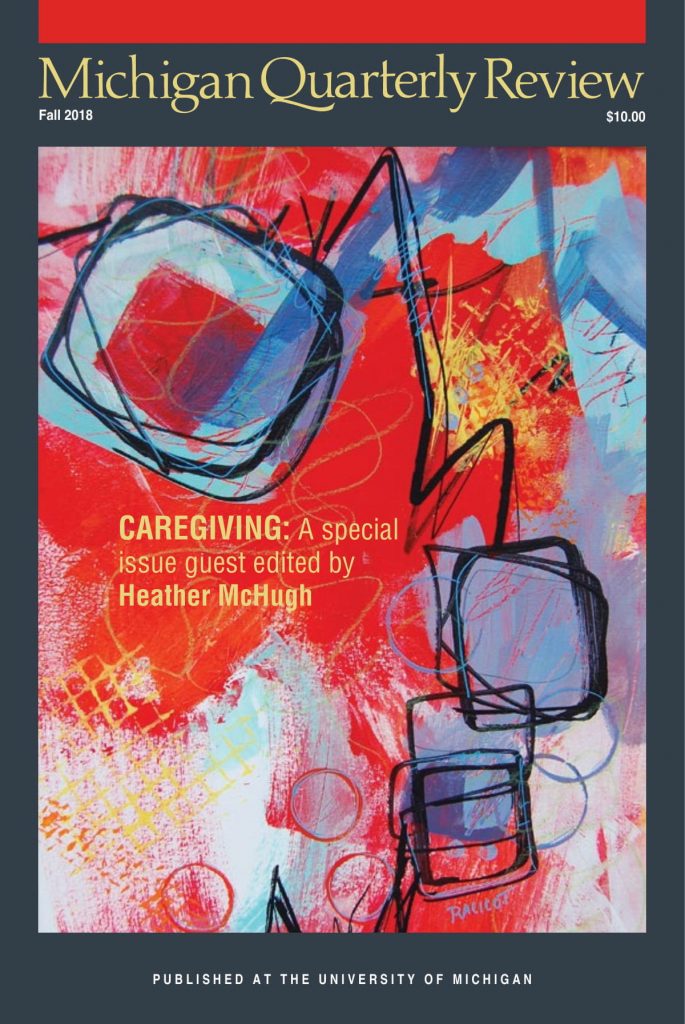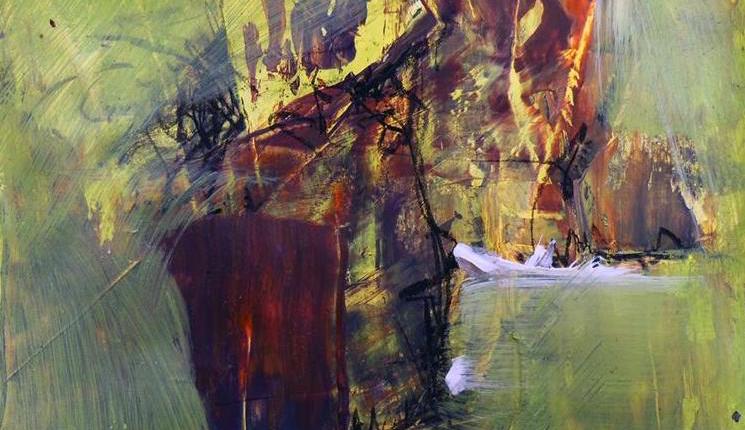“On Dignity,” an essay by DeWitt Henry, is published in conjunction with MQR’s forthcoming issue dedicated to Caregiving guest edited by Heather McHugh.
It’s an idea, dignity. An idea or image of our kind.
The idea has its history, varying from pride to humility to self-contempt.
Ancient heroes had dignity, larger than life. Achilles, Hector, Priam, Aeneus; also Medea, Electra, Dido. Aristotle explains the tragic hero as “a man not superlatively good and just, not yet one whose misfortune comes about through vice and depravity; but a man who is brought low through some error of judgment or shortcoming.” Nobility is brought to nemesis, usually by excessive pride, or hubris.
The Bible emphasizes man’s first disobedience, and subsequently the punishment for sin and vanity. The followers of false gods, the blasphemous, and the vain suffer destruction, whether Egypt’s kin or the revelers of Sodom and Gomorrah. Yet the chosen, the pious, the wise stand as our exemplars. Noah, Moses, Solomon, David, Job, and the New Testament Jesus. Heroes give way to saints, virtus to virtue, greatness to goodness.
If we choose and shape our destinies, then we portray our bodies as heroic, as in Michaelangelo’s outsized statue of David; if, on the contrary, we submit to powers greater than ourselves, then we sculpt our bodies as small, grotesque, cramped, and crushed by burdens, as in Medieval sculpture. Are we glorious, or are we wretched?
Renaissance philosophy argues for glorious. Pico della Mirandola’s Oration on the Dignity of Man, for instance, surveys the Great Chain of Being and sees man as “wondrous” because 1) God made him in his own image, and 2) God placed him in the middle:
We have made you neither of heavenly, nor of earthly stuff, neither mortal nor immortal, so that with free choice and dignity, you may fashion yourself into whatever form you choose. To you is granted the power of degrading yourself into the lower forms of life, the beasts, and to you is granted the power, contained in your intellect and judgment, to be reborn into the higher forms, the divine.
Man is “the great shape-shifter.” Mid-play, W.S.’s Hamlet takes a more soured view:
What a piece of work is a man, how noble in reason, how infinite in faculties, in form and moving how express and admirable, in action how like an angel, in apprehension how like a god — the beauty of the world, the paragon of animals! And yet, to me, what is this quintessence of dust?
 Fathers and exemplars die. Death levels all mortals, from Falstaff to Hotspur. But esteem too is personal. Subjectively we glamorize, as Hamlet does his father, or Ophelia and Laertes do Polonius. “A beast that wants discourse of reason would have mourned longer,” complains Hamlet of his mother. Our private need for value is contradicted by others’ indifference.
Fathers and exemplars die. Death levels all mortals, from Falstaff to Hotspur. But esteem too is personal. Subjectively we glamorize, as Hamlet does his father, or Ophelia and Laertes do Polonius. “A beast that wants discourse of reason would have mourned longer,” complains Hamlet of his mother. Our private need for value is contradicted by others’ indifference.
What about beasts? Darwin dismisses religious notions, but agrees that we are the highest form of animals. We’re distinguished from lower animals, not only as featherless, relatively hairless bi-peds, with broad nails, but also by the size and complexity of our brains. Thanks to eons of natural selection, we’ve progressed from apes to Neanderthals to Cro-Magnons, to us. We use tools, etc. We think we’re the only animals capable of thought and speech, give or take whale songs and the late Koko the gorilla’s signing. We question who and what we are. We have a sense of right and wrong.
Yet evolution is elitest, we’ve come to think. Animals deserve more dignity, man less. When an escaped convict in the film Runaway Train (1985) is called “an animal” by a woman witnessing his cruelty, he answers: “I’m worse than an animal. I’m human.”
The lion, we say, is the noblest of the beasts, even though the ape seems more intelligent. Both are brought back alive to serve life-sentences in our zoos.
We advocate for animal rights. Animists believe that not only do lower animals have souls, but so do vegetables and rocks. The Pythagorian notion that animal souls can possess human bodies seems to explain Lear’s elder daughters. Plato envisioned souls returning from heaven to a place where they chose new lives, human and animal. Human souls chose to inhabit animals, and souls of one animal species chose to inhabit another. Perhaps the Hindi notions of kharma and reincarnation (holy cows) are related to this.
In his 1967 bestseller The Naked Ape, Desmond Morris revisited evolution, but from a different direction, studying our animalism in love, work, and war, and lending support to the Sexual Revolution. Thanks to sexual selection, humans have the largest penises relative to body mass. Round breasts serve as “a sexual signaling device, rather than simply for providing milk to infants.” We mate to bond with each other as well as to procreate.
Stand on your dignity. Or don’t. Relax.
That’s beneath your dignity.
That’s undignified behavior.
Civility is reasoned disagreement, dignified, rather than contemptuous or childish.
Let’s discuss this like adults, we say.
Indignity, shame, affront, scorn.
Self-worth, self-respect, poise.
Maintain your dignity!
Testing your dignity: protesters taunt guardsmen; God persecutes Job.
I’m too good for this. This is unbecoming.
Don’t dignify that comment with a response.
How can you dignify killing with a lie? Such as war is noble?
False dignity.
Saving face, false face, face for the crowd.
My last shred of dignity.
Dignity can be forgotten, abused, wounded, betrayed.
Medieval nobles were celebrated by gisants, sculpted likenesses on their coffin lids similar to Egyptian kings with sarcophagi. The knight lies at rest in full armor, arms crossed over his broadsword with the cross-like hilt over his heart. On the Smith College campus, I loved Leonard Baskin’s gisant of a factory worker in this traditional pose, reclining on a slab, naked, pot-bellied, care- and work-worn, aged, but noble also in his way, in our way, as if to say attention must be paid.
In his essay “Tragedy and the Common Man” (1949), Arthur Miller argues that “the common man is as apt a subject for tragedy in its highest sense as kings were…the tragic feeling is evoked when we are in presence of a character who is ready to lay down his life, if need be, to secure one thing — his sense of personal dignity.”
I love Dostoyevsky’s humiliated characters.
Only humans can dehumanize themselves and each other.
Only humans, I think, project their faults and fears onto others of their kind. As in families, so in the family of man: Cain and Abel, sibling rivalries. One dignity degrades another.
We rape, we castrate, we enslave, we murder. We tyrannize. We practice genocide.
We are each other’s prey and predator.
We cannibalize.
The irascible beast. Buchenwald. Jihadi John.
The Abu Ghraib torture and abuse.
Because we can.
Is dignity a right? The right to be valued? To be clothed, fed, and sheltered? To health? To birth? The right to choose?
To some dignity seems a luxury, secondary to comfort or survival.
Are we nobler in Nature than in civilized society? Do laws and conventions, cities, conveniences, power, and governments inspire or corrupt us? For every Thoreau there is Conrad’s Decoud, marooned on a desert island:
Solitude from mere outward condition of existence becomes very swiftly a state of soul in which the affectations of irony and skepticism have no place. It takes possession of the mind, and drives forth the thought into the exile of utter disbelief. After three days of waiting for the sight of some human face, Decoud caught himself entertaining a doubt of his own individuality. It had merged into the world of cloud and water, of natural forces and forms of nature….Both his intelligence and his passion were swallowed up easily in the great unbroken solitude of waiting without faith.
He shoots himself.
Can death be dignified? And for whom — the person dying, or the living who witness and endure the loss, reflecting on their own turns to come?
Cornered by life, Stoics choose suicide: “A Roman by a Roman valiantly vanquished,” boasts Antony. Sudden, accidental deaths, as well as unforeseen natural ones, offend us, while death in battle, for instance, we call the greatest sacrifice.
A person with a terminal disease also battles. Cornered by their bodies, do they have a right to stop death-prolonging operations and treatments, or to opt for assisted suicide? If so, when? The moment they are diagnosed? The moment that quality of life declines? Can law and medicine offer us peace of mind, freedom from pain, and a gentle death? From Thom Jones story “I Want to Live,” originally published in Harper’s:
“She realized that when she got right down to it, she wanted to live, more than anything, on almost any terms, so she took more cisplatin … A month later she was off that poison … How fast would it move, this wildfire brand? Better not to ask … The Will to Live was more important than doctors and medicines. You had to reinvigorate the Will to Live…. Dialude. It wasn’t working…. Was methadone the ultimate or were there bigger guns? Street heroin.”
Even those facing capital punishment can keep dignity. “Nothing in his life became him like the leaving of it,” we hear of Cawdor in Macbeth. “He died / As one that had been studied in his death, / To throw away the dearest thing he owed / As ‘twere a careless trifle.” Executions can be more or less humane, as well. The blindfold or hood. Axe or swordsman. Crucifixion. Hangman. Guillotine. Firing squad. Gas chamber. Electric chair. Lethal injection.
We’re all on death’s row, according to Elizabeth Kubler-Ross.
It is inconceivable for our unconscious to imagine an actual ending of our own life here on earth, and if this life of ours has to end, the ending is always attributed to a malicious intervention from the outside by someone else. In simple terms, in our unconscious mind, we can only be killed; it is inconceivable to die of a natural cause or of old age.
We’re like Kafka’s K., perhaps, baffled by etiquette:
Once more the odious courtesies began, the first handed the knife across K. to the second, who handed it across K. back again to the first. K. now perceived clearly that he was supposed to seize the knife himself, as it traveled from hand to hand above him and plunge it into his own breast. But he did not do so…. He could not completely rise to the occasion, he could not relieve the officials of all their tasks…. But the hands of one of the partners were already at K.’s throat, while the other thrust the knife deep into his heart and turned it there twice. With failing eyes K. could still see the two of them immediately before him, cheek leaning against cheeks, watching the final act. “Like a dog,” he said; it was as if the shame of it must outlive him.
Personhood counts for everything. Platitudes. Half-time exhortations. What you know, you know, says Iago.

Image: Vuckovic, Namanja. “Beast.” 2016. Mixed media.
DeWitt Henry was the founding editor of Ploughshares. He has published a novel, two memoirs, several anthologies, and most recently, Sweet Marjoram: Notes and Essays (Plume Editions/MadHat Press, 2018). He is a Professor Emeritus at Emerson College. Find out more at dewitthenry.com.




